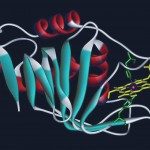Lien vers Pubmed [PMID] – 15731456
Science 2005 Feb;307(5713):1313-7
Shigella, the leading cause of bacillary dysentery, uses a type III secretion system (TTSS) to inject proteins into human cells, leading to bacterial invasion and a vigorous inflammatory response. The bacterium is protected against the response by the O antigen of lipopolysaccharide (LPS) on its surface. We show that bacteriophage-encoded glucosylation of Shigella O antigen, the basis of different serotypes, shortens the LPS molecule by around half. This enhances TTSS function without compromising the protective properties of the LPS. Thus, LPS glucosylation promotes bacterial invasion and evasion of innate immunity, which may have contributed to the emergence of serotype diversity in Shigella.







